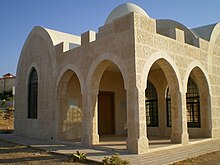Abd-al-Rahman ibn Awf
| 'Abd al-Rahman ibn 'Awf | |
|---|---|

|
|
| Companion of Muhammad | |
| Born | c. 580 CE Mecca |
| Died | c. 652 CE Jordan |
| Venerated in | Islam |
| Influences | Muhammad |
'Abd al-Rahman ibn 'Awf (Arabic: عبد الرحمن بن عوف) (c. 580 CE – c. 652 CE) was one of the companions of the Islamic prophet Muhammad. Mostly known for being of the Ten Promised Paradise.
His original name was Abdu Amru ("servant of Amru"). It was Muhammad who renamed him 'Abd al-Rahman ("servant of the Most Merciful"). His name has also been transliterated as Abdel Rahman Ibn Auf.
Abu Bakr spoke to 'Abd al-Rahman about Islam, then invited him to meet Muhammad, who heard his declaration of faith and taught him the Islamic prayers. This was before the Muslims had entered the house of Al-Arqam; 'Abd al-Rahman was one of the first eight men to accept Islam.
From about 614 the pagan Quraysh in Mecca "showed their enmity to all those who followed the apostle; every clan which contained Muslims was attacked." The usual threat to Muslim merchants was: "We will boycott your goods and reduce you to beggary."
'Abd al-Rahman was one of a pioneering party of fifteen Muslims who emigrated to Abyssinia in 615. Other Muslims joined them later, forming a group of over a hundred. "They were safely ensconced there and grateful for the protection of the Negus; could serve God without fear, and the Negus had shown them every hospitality." In late 619 or early 620 "they heard that the Meccans had accepted Islam." This probably refers to the Gharaniq episode. 'Abd al-Rahman was one of forty who "set out for the homeland. But when they got near Mecca they learned that the report was false, so that they entered the town under the protection of a citizen or by stealth."
In 622 'Abd al-Rahman joined the general emigration of Muslims to Medina, where he lodged with Saad ibn Al-Rabi until he could re-establish his business.
'Abd al-Rahman was friends with Umayyah ibn Khalaf, a stern opponent of Islam. When 'Abd al-Rahman emigrated to Medina, the two reached a written agreement, according to which 'Abd al-Rahman was to protect Umayyah's property and family in Medina, while Umayyah would protect 'Abd al-Rahman's in Mecca. When 'Abd al-Rahman wanted to sign the document, Umayyah protested, saying "I do not know Ar-Rahman" and requested that the pre-Islamic name "Abdu Amr" should be used, to which 'Abd al-Rahman agreed.
...
Wikipedia
